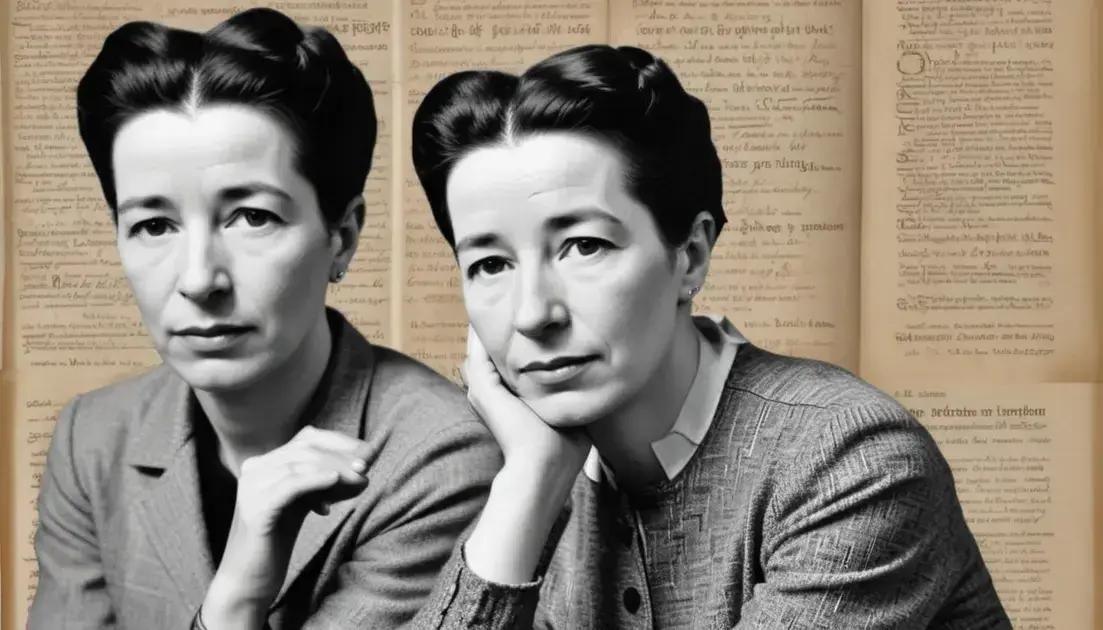
Simone de Beauvoir: The Second Sex and Female Freedom
Simone de Beauvoir’s influential book, The Second Sex, significantly shaped modern feminism by challenging traditional gender roles and advocating for women’s freedom and equality. Her analysis reveals how societal structures define women as the “Other,” inspiring discussions about gender identity and autonomy. Beauvoir’s legacy continues to drive feminist movements, encouraging women to embrace their choices and strive for equality in all aspects of life.
Exploring existentialism through the lens of Simone de Beauvoir reveals a fascinating intersection of philosophy and women’s emancipation. How did her ideas shape feminist discourse? Let’s dive in!
The philosophical roots of existentialism
Existentialism is a philosophy that focuses on individual freedom and choice. It asks big questions about life, meaning, and existence. This branch of philosophy suggests that people create their own meaning through their choices and actions.
The Origins of Existentialism
Existentialism started in the 19th century with thinkers like Søren Kierkegaard and Friedrich Nietzsche. They focused on personal experience and the importance of individual perspective. Kierkegaard said that we must make choices, which often leads to anxiety. Nietzsche challenged traditional beliefs and proclaimed that “God is dead,” urging people to create their own values.
Key Ideas of Existentialism
One major idea is that existence comes before essence. This means that we first exist, and then we define ourselves through actions. There’s also the concept of absurdity, which feels like searching for meaning in a chaotic world.
Simone de Beauvoir’s Contribution
Simone de Beauvoir brought existentialism into feminist discussions. She argued that one is not born a woman, but becomes one. This idea emphasizes that gender roles are socially constructed, not biologically predetermined.
Existentialism encourages people to live authentically, embracing their freedom. This means making choices that reflect our true selves. Beauvoir’s work inspired many to challenge the norms and fight for equality.
Women in existentialism: Simone de Beauvoir’s role
Simone de Beauvoir played a key role in existentialism and feminist thought. She challenged traditional views of women’s roles in society. Her work emphasized that women are not defined by biology but by their choices.
Beauvoir’s Famous Work
In her book The Second Sex, Beauvoir explored how women have been treated as the “Other” throughout history. She argued that this status limits women’s freedom and opportunities. Her ideas sparked important conversations about gender equality.
The Concept of Freedom
Beauvoir believed in the importance of women’s freedom. She argued that women must claim their own identities. This means taking charge of their lives and making choices without societal pressure. Her ideas encourage women to pursue their dreams.
Existentialism and Gender
Existentialism fuels the idea that individuals create their own meaning. Beauvoir applied this to women’s lives. She stated that women must escape from roles imposed on them. This perspective gives women a voice in shaping their futures.
Beauvoir’s thoughts continue to inspire many today. She encourages women to understand their potential. Her legacy helps to fight for women’s rights and social justice.
Impact of The Second Sex on modern feminism
The Second Sex by Simone de Beauvoir changed the way we think about feminism today. This groundbreaking book challenged the roles assigned to women in society. It opened doors for discussions about gender equality and women’s rights.
Key Themes of The Second Sex
Beauvoir discussed how women have been viewed as the “Other”. She showed that society often defines women by their relationships with men. This perspective helped many understand why equality is essential.
Influencing Feminist Movements
The ideas in The Second Sex inspired the second wave of feminism in the 1960s and 70s. Women began to raise their voices and demand equal rights. They fought for issues like reproductive rights and workplace equality.
Modern Feminism and Legacy
Today, Beauvoir’s influence can be seen in many feminist discussions. Her work encourages women to take control of their identities. It reminds us that feminism is not a one-size-fits-all solution and should embrace all voices.
Through her writing, de Beauvoir empowered countless women to challenge societal norms. Her courage and insights continue to shape the fight for gender equality.
Conclusion
In conclusion, Simone de Beauvoir’s work, especially The Second Sex, has had a lasting impact on modern feminism. Her ideas challenged society’s views and encouraged women to seek equality. By understanding gender roles and embracing personal freedom, women have fought for their rights and made significant strides.
Beauvoir’s thoughts remind us that feminism is diverse and must include all voices. As discussions about gender continue to evolve, her legacy inspires new generations. The fight for equality is ongoing, and the insights from The Second Sex remain relevant today.


